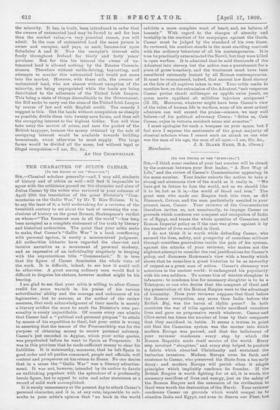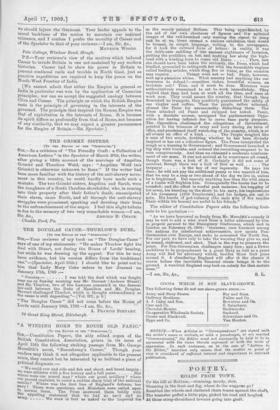(TO VIII rearm OF TUN " srecr.vroaai SIR,—I think some
readers of your last number will be struck by the contrast between your first leader, " A New Way of Life," and the review of Caesar's Commentaries appearing in the same number. Your leader exhorts the nation to take a strong and strenuous view of the world as it really is. "We have got in future to face the world, not as we should like it to be, but as it is,—the world of blood and iron." The great men who made our Empire took this view, as did. Bismarck, Cavour, and the man particularly assailed in your present issue, Caesar. Your reviewer of the Commentaries therefore invites us, not unnaturally, to impugn Caesar on grounds which condemn our conquest and occupation of India or of Egypt, and treats the whole question of Caesarian and Roman Imperial policy as if the case was given against it by the number of lives sacrificed in Gaul.
I do not think it is worth while defending Caesar, who secured the lives, safety, and prosperity of countless millions through countless generations inside the pale of his system, against the attacks of your reviewer, who makes not the slightest attempt to consider the real justifications for Caesar's policy, and dismisses Mommsen's view with it brevity which shows that he considers a .great historian to be as unworthy of respect as a great man of action. Caesar's clemency was notorious in the ancient world: it endangered his popularity with his own soldiers. To accuse him of wanton slaughter is infamous: to condemn him for necessary slaughter is to be a Tolstoyan, or one who denies that the conquest of Gaul nnd the preservation of the Roman Empire were to the advantage of humanity. Does your reviewer suppose that Gaul before the Roman occupation, any more than India before the British Raj, was the haven of idyllic peace ? In both countries the war of tribe against tribe sacrificed countless lives and gave no progressive result whatever. Caesar and Clive saved ten times the number of lives by their conquests that they sacrificed in battle, it seems a truism to point out that the Caesarian system was the mortar into which modern Europe was poured, and that the indictment of your reviewer condemns every step by which the Roman Republic made itself master of the world. Every step involved "slaughter," and every step helped to produce a fabric which absorbed Christianity and sustained the barbarian invasions. Modern Europe owes its faith and existence to Caesar, who preserved the State from a too early decay : and modern Europe will perish when it adopts principles which implicitly condemn its founder. If the British Empire is worth fighting for at all, it is worth the necessary sacrifices of lives and energy, just as the safety of the Roman Empire and the extension of its civilisation to Gaul were worth the destruction of the Nervii. Your reviewer condemns Caesar on grounds which would compel us to abandon India and Egypt, and even to disarm our Fleet, lest 'we should injtre the Germans. Your leader appeals to the moral backbone of the nation to maintain our national existence, and I confess I prefer the morality of Caesar and of the Spectator to.that of your reviewer.—I am, Sir, &c., Vale Cottage, Windsor Road, Slough.
MA.URICE WOODS.
P.S.—Your reviewer's view of the motives which induced Caesar to invade Britain is one not sustained by any modern historian. Caesar had to show his power in Britain to prevent continual raids and trouble in North Gaul, just as Punitive expeditions are required to keep the peace on the North-West Frontier of India.
We cannot admit that either the Empire in general or India in particular was won by the application of Caesarian principles ; nor can we accept the suggested analogy between Clive and Caesar. The principle on which the British Empire rests is the principle of governing in the interests of the governed. The principle that inspired the Roman Empire was that of exploitation in the interests of Rome. It is because its spirit differs so profoundly from that of Rome, not because of any similarity, that we may expect a greater permanence for the Empire of Britain.—En. Spectator.1







































 Previous page
Previous page